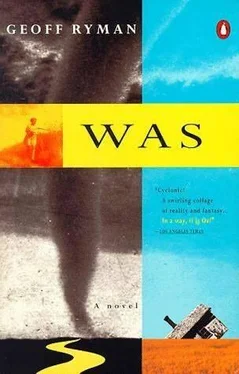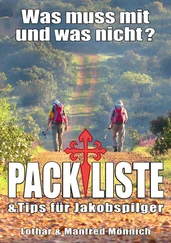"It's okay, you can get through," said Bill, distracted. Elbow across his eyes, he stood up. There was still glass in the windows, and a glass jar on one of the windowsills. There was a paintbrush in it.
"Wait for me!" Jonathan screeched.
Bill turned around and shrugged his way back through the trees. The clearing was empty. There was the sound of the car starting.
"Jonathan?" shouted Bill.
He heard the car pulling away, dirt spurting out from under the wheels. Bill sprinted across the clearing. Through the trees he could see the gray car accelerate, swerving. Bill got caught on the barbed wire. He slipped down the grass in the ditch. His trousers tore. He pulled himself back up and over the fence, into the lane.
The car had stopped. Dust still rose from it. The driver's door hung open. Bill broke into a run, down the row of telephone poles toward the hill. He got to the car. Its engine was still running. The key was still in the ignition. It swung back and forth like a clock.
Bill looked around him, shouting "Jonathan!"
On the right, bare and harvested, there was no one.
"Where are you?" Bill started to run across the fields, toward Dorothy's farm and then stopped. This is crazy, he thought. There's nowhere to hide. If Jonathan was ahead of him, he would see him, running. If he had fallen over, he would still see him, there was no cover, Bill could see every clump of dirt.
Bill turned and pelted back toward the car, up and over the lane and down into the other fields.
"Jonathan!" wailed Bill. "Answer me!" He thought Jonathan was lying hidden among the sorghum. He plunged down into its midst and ran across the orderly rows, looking up and down them. Nothing. No one.
They had husbanded the lower slopes; they had dug ditches across the fields to drain the wallows, the buffalo wallows where children disappeared.
It was crazy, but Jonathan had gone.
Dreamtime and Zeandale, Kansas-1883
It seems that spring has come once more and farmers go forth to seed their fields. Some oats are already sown. The rain has moistened the earth, making a good outlook for rich harvests. Though nature seems to smile upon the fields, yet some heavy hearts rest among us, grieving over the departed soul of Sister Reynolds.
…Though her body was broken
Through her misery unspoken
Though deformity changed her aspect
Though earth's duties were hard,
She complained not a word,
For all these she could leave in the casket.
She was gentle and kind
Always bearing in mind
That she had a work to perform
And with meekness and love
All things were performed in their turn…
To those children so dear
To their mother while here,
We would say in their anguish and sorrow
Be strong in the Lord
Abide in his word
Eternity is only tomorrow…
– Lines written by "True Friendship" on the death of Etta Parkerson Reynolds, as published in the Manhattan Nationalist , March 18, 1889, as recorded by Ellen Payne Paullin in her edition of Etta's Journal
Inside the cyclone, Dorothy dreamed.
She dreamed she was still on the road westward, walking toward Wichita. Wilbur F. Jewell was with her. Wilbur was still thirteen. He was now as old as Dorothy. Wilbur was dressed like an Indian, with a colored headband with feathers and painted lines on his face. He had gone to the Territory and found the Indians and lived with them. Dorothy's heart swelled with happiness for him. Wilbur had come back from the Territory to find her and take her with him. The Territory would be full of Indians and buffalo and magic. Wilbur was tall and bony and gangling, and he looked so young to her now. Dorothy knew in her dream that she loved him, would have loved him if he had lived.
America walked with them, westward out of the East. Dorothy dreamed that they had stopped in a wayside camp. There were wagons and tents. There were women in gingham dresses and children in smocks and narrow-eyed men in black hats. The men mumbled with metal bars in their mouths.
The adults were in harness. Great thongs of leather led out from the bits in their mouths, and their eyes were circled with rings of exhaustion and shielded by black leather blinders. They wore them even as they sat slumped on the ground, sprawled carelessly around small grubby fires. There was ash and blood on their hands, and they were burning coffee black in greasy tins. Beside the camps there were mounds of buffalo bones bleaching in the sun. Children ran up them barefoot. Under their feet, clattering hip bones had sockets like eyes. All around them, on either side of the road, there were stumps of trees, lined up like tombstones.
There was a constant sound of chopping. Dorothy saw, beyond the stumps, the blue-green tops of conifers. They waved back and forth and then fell out of sight with a distant crash. Wilbur and Dorothy went to look. The sound grew louder, multiplied many times.
There were Mechanical Woodsmen. They were a labor saving device, a sign of progress like telephones. They went on chopping and chopping, cutting out sections of living wood. The Mechanicals were steam-driven, jets of it coming out of funnels in their heads. Wreaths of acrid orange-brown smoke came out of their mouths. Their faces, their arms, their legs, were coated in thick black grease. Whirling gears and belts moved them and they dripped scalding water. They couldn't keep themselves from cutting down the trees.
One of them looked up at Dorothy and she saw he had living eyes. He wept boiling water. The eyes were Uncle Henry's. It's not my fault, he seemed to say, I can't help it. He looked embarrassed, ashamed, as he slammed an ax into the trunk of a cedar.
Dorothy knew then that she was frightened of men, almost all men except for Wilbur. She wondered how she would ever learn to love men or live with them.
A whistle blew, a long mournful sound like all the loneliness that drove the men and the machines. The Mechanicals hissed and chuffed and came to a halt, ready to move on.
"All aboard!" someone cried.
The people of the camp groaned and stood up. The leather harnesses creaked and stretched. The adults were hauling their houses behind them. They were all moving West, to escape the past, escape the East. Why didn't they ever look behind them? Did they never wonder why they were so weary and mean? Dorothy knew and despised them. They were all pulling the East with them.
They carried guns. They shot things. They shot anything that moved. They shot a black man running toward freedom. There were flocks of deer, bounding away, white tails like the waves of the sea. Rifles crackled and the deer fell, their legs suddenly breaking under them like twigs. There were clouds of birds in the sky, darkening the sun. The men raised their rifles like thunder, and there was a rainfall of blood, blood and feathers, and pelting corpses of pigeons. People slipped on blood. Without thinking, without even knowing, the men raised their rifles and fired.
Lift the rifle. Crack. Lower the rifle. Lift the rifle. Crack.
One of them turned to Dorothy, coated in grease, grinning.
"We're civilizing the country," he said.
Dorothy knew that by the time they got to the Territory, it would be gone, always advancing away from them like a rainbow.
They all walked on, toward Wichita.
As the settlers drew near Wichita, there was a great lowing sound and a cloud of dust ahead of them. A herd of Bad Women was being driven toward the river.
"Yee ha!" the cowboys on horseback shouted and herded the women down the banks so they could wash. The women were brown with dust and they skidded down into the water, their dirty stolen dresses billowing out on the surface of the river.
Читать дальше












